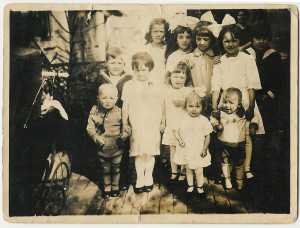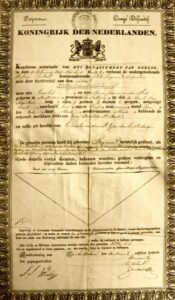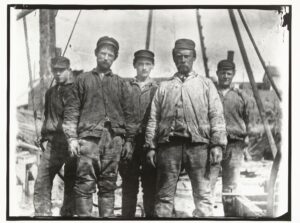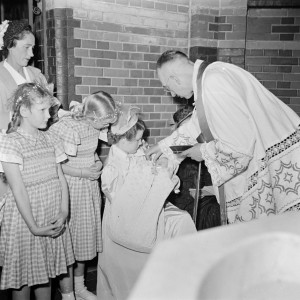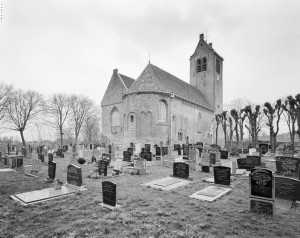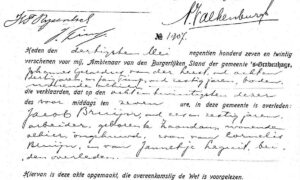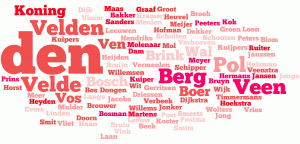A reader asked me how to find all the children of an ancestral couple. The strategies and sources depend on the period. 1600s, 1700s Sources: Search baptismal, marriage, and burial records to find the baptisms, marriages, and burials of all the children. If one of the parents died before the youngest child was 25, check for guardianship appointments and accounts. Check estate inventories or estate divisions of the parents and grandparents to see which children and grandchildren … [Read more...]
Ask Yvette – Military passports in the 1800s
Reader Freddy Walhof asked me about the practice of military passports in the 1800s. In the military service record of an enlisted man, the column for end of service said "gepasporteerd" which means "passported." Freddy wondered if an actual passport was issued or if this was an administrative term only. At the end of service, enlisted men were issued a military passport. This contained an extract of their service record, including that they had fulfilled their military duties. Since these … [Read more...]
Ask Yvette – Difference between arbeider, werkman, dagloner
A reader asked me what the difference is between the occupations arbeider, werkman, and dagloner. Arbeider and werkman are synonyms and both mean "laborer." These are usually people who work for an employer for a longer period of time, typically a year, in return for an annual wage. A dagloner is a day laborer, somebody who does not have a fixed employer but is hired and paid per day. All these occupations perform manual labor, typically unskilled, for an employer. Laborers were usually … [Read more...]
Ask Yvette – How to record names with different spellings
I was tagged in a Facebook post asking how to deal with variations of surnames in your genealogy software. Genealogy software typically requires us to choose one name as the default to use in reports and lists, and allows us to enter alternative names. I use three different strategies to select which name to use as the main name, depending on when the person was born. I record other names and major spelling variations as alternative names. Born after the civil registration The civil … [Read more...]
Ask Yvette – Where to Find Dutch Church Records After 1811?
TL read the tip that you should check church records after 1811 and wants to know where these records are kept, particularly for the province of Groningen. When the civil registration was introduced in 1811 (or slightly earlier in some parts of the Netherlands), churches were required to turn over their registers of baptisms, marriages, and burial to the government. There is no such requirement for later church records. Although churches are free to determine where to keep their records, … [Read more...]
Ask Yvette – How to find a Dutch will
One of our Twitter followers, Karen de Bruyne, asked on Twitter how to find the will of her great-grandfather-in-law Jacob Bruijn, who died in The Hague on 28 May 1927. Since there are several ways to go about it, I thought I would write a blog post about it. Most people in the Netherlands did not have wills, either because there was not much to inherit, or because they were happy with the default way their estate would be inherited. Since 1811, wills were recorded by notaries. Before … [Read more...]
Ask Yvette – Is an online tree a source?
In the Facebook group Goeree-Overflakkee History, Genealogy, and DNA, Rene Luijkenaar asked me a question: What can be counted as a source? Can an online tree be counted as a source? I thought I would answer in a blog post, since I know other people have the same questions. Sources are containers of information. There are three types of sources: original, derivative, and authored. I will discuss each type, with examples from the Netherlands. Original source An original source is the first … [Read more...]
Ask Yvette – Is my last name Dutch?
One of the questions I get asked frequently in person is whether a certain surname is Dutch. That can be tricky to answer, especially if a name got spelled differently after emigration. To find out where your name comes from requires genealogical research to trace the line that bears the last name back to its place of origin. That being said, here are a few resources to see if a last name occurs in the Netherlands: Database of surnames in the Netherlands. This is the first place to … [Read more...]
Ask Yvette – What happened to the Digitale Stamboom?
One reader contacted me to ask: I have lost a Dutch records site. It was called Dutch Municipal Records, and the URL was http://digitalestamboom.nl. That site now appears to be totally dead, because even the home page gives a 404 result. Can you refer me to a current URL? Or is the site simply gone? What was the Digitale Stamboom? The Digitale Stamboom, the Digital Family Tree, was a website created by a vendor of website software for genealogical information. Several archives used … [Read more...]
Ask Yvette – How to Record Transgender People?
In the Netherlands, it's legal for transgender persons change their gender and names on their birth records and in the population registration. You need to be at least sixteen years old and need a declaration by a gender specialist before you can go to the municipality to have your information changed, so it's not an easy process. In recent years, the requirement to have gender confirmation surgery was dropped, so transgender people can now have their gender changed without undergoing forced … [Read more...]
